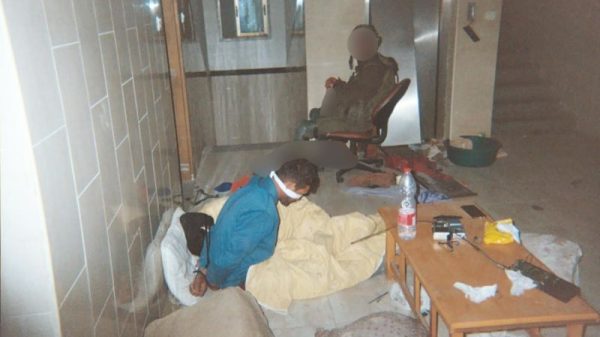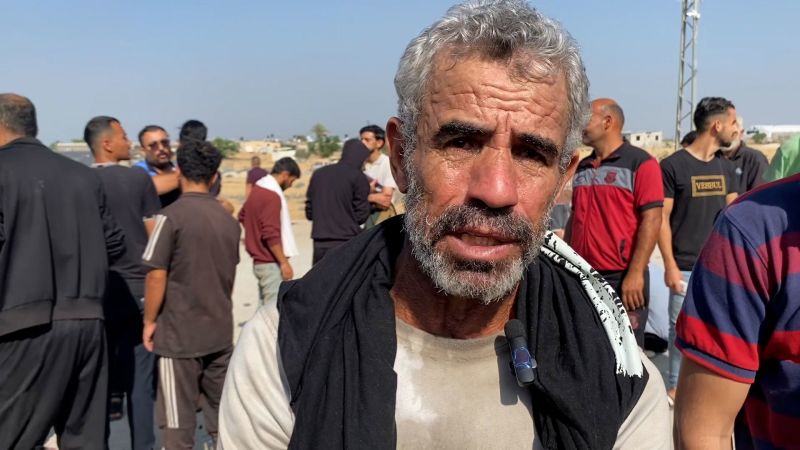Palestinian workers who were expelled back to Gaza from Israel last week have accused Israeli authorities of “torture,” alleging they were stripped naked, held in cages, viciously beaten and, according to one worker’s account, subjected to electric shocks.
Most workers from Gaza work in construction or agriculture. They tend to spend weeks away from home, rather than commuting, which is why so many were in Israel when Hamas launched its terror attack on Saturday October 7.
Al Radia said that right after the war started, he and some of the other Gazan workers fled to Rahat, a predominantly Arab Bedouin city in southern Israel, where he says they were turned over to the Israeli army by local residents.
“(The military) took our phones and money, we couldn’t communicate with our families, we were given food on the floor in plastic bags,” he said.
The security official said that in some cases, their detention was also for their own protection, as they were at risk of violence from Israeli communities.
Six human rights organizations in Israel have filed a petition to Israel’s High Court arguing these detentions were “without legal authority and without legal grounds.”
Gisha, an Israeli not-for-profit organization focused on protecting the freedom of movement of Palestinians and one of the groups behind the petition, said in a statement last week that it had “reason to believe that the holding conditions in these facilities were extremely dire, and that detainees were subjected to extensive physical violence and psychological abuse, as well as being held in inhumane conditions.”
Many of the workers say they had no idea where they were taken. According to the Palestinian Prisoners Society, a human rights organization based in the occupied West Bank, many were held in two detention centers: one in Ofer near Ramallah and one in Salem near Jenin.
Another worker from Beit Lahiya, Mahmoud Abu Darabeh, also described beatings by what he says were Israeli forces.
Abu Darabeh said he was detained on the second day of the war. “They put us in cages like dogs, beatings, insults, they didn’t care whether people are ill or not, some of us were injured, their feet got rotten because they didn’t get any medical treatment,” he said.
The men faced daily interrogations from the Israeli authorities asking about their homes and family members, Abu Darabeh said.
He also described how some of the workers died during detention and while crossing into Gaza.
“Some people died on the way here because they were beaten and subjected to electric shocks,” Abu Darabeh said. He said he personally witnessed others who were detained with him being shocked.
“There have been cases of abuse towards the detainees outside of the official detention facilities. These cases were treated very seriously, and they were dealt with disciplinary measures,” the official said through a translator, saying that to their knowledge, four soldiers were removed from the IDF following incidents of abuse and two soldiers were put in military prison for their conduct.
When asked if any of the detainees died as a result of abuse, the official said that they were aware of two deaths of Gazan workers who were detained, but said these deaths were the result of chronic, long-term health issues these workers had before entering Israel, not the result of abuse.
The official said that, to his knowledge, these abuses did not include electric shocks.
‘They tied our arms, blindfolded us’
In response to the attacks, Israel began an unrelenting bombing campaign on Gaza, while the country’s defense minister Yoav Gallant ordered a “complete siege” on the enclave.
Before the October 7 attacks, about 18,000 Gazans had permits that allowed them to cross into Israel for work – where wages can be as much as ten times higher than in Gaza.
All of them would have been subjected to a rigorous security clearing process by the Israeli authorities before being issued the permit.
Immediately after the attack, Israel also revoked the Gazan workers’ permits, which made it illegal for them to stay in the country. Since returning to Gaza was not a possibility, many tried to flee to the occupied West Bank.
The security official said that at the beginning, some of the facilities didn’t have shade, but added this was rectified within a few days. The official said detainees were only restrained when in transit.
One man, from the Al-Maghazi refugee camp, sobbed as he described how they were packed into metal cages and deprived of sleep, a known form of torture.
“Every now and then, they came to us and asked us to stand up. Stand up, sit down, stand up, sit down, stand up,” he said. “In one place, we were around 150 people in a metal cage. It smelled very bad, I think it was used for chickens or rabbits before,” he added.
“They beat us and stole our money, and they took our clothes off and kept us naked,
I was only in my underwear for more than 20 days,” he said.
‘Dehumanization and insults’
Amani Sarahneh, spokesperson for the Palestinian Prisoners Society, said some of these men were detained on the way to the West Bank while some were detained in the West Bank.
The men tried to reach the occupied West Bank because once Israel revoked their permits, they were in legal limbo – their stay in Israel became illegal, but there was no clear way back to Gaza with border crossings on both the Israeli and Egyptian side closed. While they also need permits for the West Bank, it was safer for them to be in a territory that is under Palestinian control, they believed.
“Most of the testimonies were about being starved, being continuously beaten during the day, handcuffed, isolated from their surroundings,” she said, adding that videos showing Palestinian prisoners being treated violently and in an inhumane manner have surfaced online.
“They didn’t do anything wrong; they were not charged with anything … yet many of them were interrogated and systematically tortured, abused, brutally beaten, they faced all kind of dehumanization and insults,” she added.
Dror Sadot, a spokesperson for B’Tselem, the Israeli Information Center for Human Rights in the Occupied Territories, an NGO, said the October 7 attacks by Hamas have led to a huge spike of aggression towards Palestinians.
She said that this rhetoric and the anger over the crimes of Hamas trickles down to the individual soldiers, who then treat any Palestinian with rage.
Sadot said that long-term experience with the way the IDF generally handles cases of abuse is not convincing.
“We’ve been investigating this for so many years – the military enforcement system works as a whitewash mechanism with almost no indictments,” she said. “So they will say ‘those are the exception, not the rule,’ but if the impunity for soldiers continues – and not just the soldiers but also the policy itself – when no one’s being held accountable, of course, things will just continue,” she added.
Exhausted and injured, but overjoyed to be back
Some are elderly, visibly exhausted, and drenched in sweat, while others appear to be injured.
At least three have deep, visible cuts on their wrists which appear to have been caused by hand ties.
Most of the men are not carrying any personal belongings apart from the clothes they are wearing.
One man, 58-year-old Mohamed Atallah, was wearing a plastic number tag on his wrist.
They touched the ground with their foreheads, thanking God to be back in Gaza – the place that has become a hell on earth since they last left it.







































